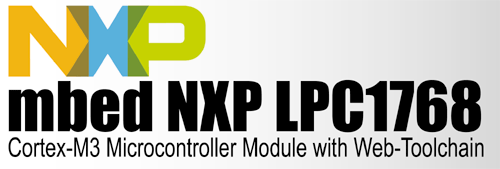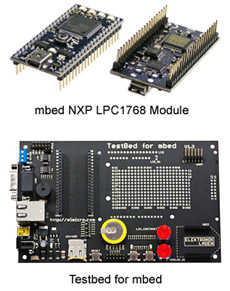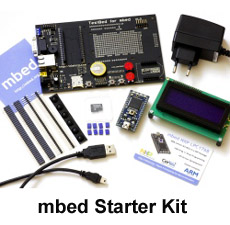 |
| |
mbed NXP LPC1768 Cortex-M3 Microcontroller Module with Web-Toolchain OVERVIEW |
|
|
|
|
|
| |
The mbed controller module is equipped with an NXP LPC1768 MCU, which is based on ARM's Cortex-M3 32 Bit core architecture. With the mbed module and an online development environment by ARM, the creation of prototypes and test circuits is done in a completely new and easy manner. |
| |
|
|
|
 |
Rapid Prototyping with Cortex-M3 |
|
|
The mbed controller module is equipped with an NXP LPC1768 MCU, which is based on ARM's Cortex-M3 32 Bit core architecture. With the mbed module and an online development environment by ARM, the creation of prototypes and test circuits is done in a completely new and easy manner.
The mbed is built as an extra wide DIL40 package (row distance of 900mil and 100mil pin grid) for inserting the module in breadboards or custom circuits. This solderless connection enables the mbed to be used in several different applications without worries.
|
 |
Download via Drag-and-drop |
|
|
Brilliantly easy is the way the mbed is loaded with compiled code: The connection to the host PC is done via USB. Mbed behaves like a mass storage device and, when using Windows, gets a drive letter assigned. Now the online-compiler offers a binary which is downloaded to the mbed. And voila - the mbed is flash-programmed on-the-fly!
To accomplish this, the mbed module uses a secondary controller managing the communication with the host PC as well as programming the LPC1768. Doing things this way results in two crucial advantages: At first, code download can be considered as a black box - the user doesn`t need to know more than that the firmware image is written in the MCU`s flash. Secondly, there are no ressources of the target MCU used like it would be the case with a traditional bootloader. It is possible to write own software without care for any restrictions of the development hardware.
|
 |
No installation effort |
|
|
What prevents developers from trying out new technology, for example a new microcontroller? The biggest reason would likely be the huge amount of time needed, especially the time for installing, configuring and getting used to the required toolchain. ARM has identified this problem and makes an offer hardly to decline: the cost-free usage of the ARM Realview Compiler for developing mbed software. And the best thing - no local installation is needed, the compiler just runs in a web-browser!
This solution is far away from being just a cheap toy as the Realview Compiler is also used in the KEIL MDK-ARM package - a software which normally sells in the kEUR region! Furthermore, the mbed user takes advantage of extensive libraries for simple APIs (driving/reading GPIOs, setting up Timers etc.) as well as complex features like USB, TCP/IP and more. All this for the cost of a few mouse clicks to access the mbed.org online platform!
|
 |
Online C++ Development Environment |
|
|
Congenial side effect of the browser-based C++ Development Environment is the absence of restriction to use a certain operation system. Developing mbed-style means to choose freely between any operation system out there - MAC, Windows, Linux. The only requirement is a web browser and a USB port. As the compiler stores the source code online the mbed user is no more bound to a single PC. Mbed allows working on a project from different places and at different times - 24 hours a day, if necessary.
Of course mbed's web-based solution isn't designed for genuine product developments, caused by the very absence of traditional debug abilities for example. But when it comes to quickly manufacture a working prototype (Proof-of-Concept) or a demonstration, mbed is hardly to be beaten. Considering this, it could be possibly accepted that ones own sourcecode is entrusted to the mbed platform (and the guys standing behind the project). It applies, once more, that crucial data should go into the safe and not into the cloud!
|
 |
TestBed for mbed
|
|
|
With TestBed for mbed we offer a development board which is richly equipped with extras to easily unleash the power of the mbed module. While developing this carrier board, we tried to consequently follow the spirit of Rapid Prototyping and therefore providing the user with lots of possibilities for hardware expansions around the mbed.
Most important are the communication interfaces. With USB, RS485, CAN and RS232-TTL, various communication gateways are available. For mbed, an ethernet connection is mandatory, so TestBed comes with a RJ45 jack with magnetics and two signalling LEDs included.
A backlit alphanumeric LC-Display (LCD20X4BLU) can be mounted directly on the TestBed for displaying status information. GPIO-saving 4 bit mode is used to drive the display. Contrast of the LCD is adjustable using a trim pot mounted on TestBed.
Another highlight is TestBed's ability of getting Arduino-Shields attached to it. That provides amazing new possibilities using the wide variety of available shields - combined with the immense calculating power of mbed's modern Cortex-M3 heart!
To support wireless communication features an XBee-socket has been added to TestBed as well. We offer several wireless modules with the popular XBee footprint, for example: Original Xbee-Modules, a 868MHz RF module, a GPS-Receiver and this Bluetooth solution.
|
 |
The mbed Starterkit |
|
|
The mbed Starterkit provides a convenient way of getting started with mbed. The kit contains an mbed module and a TestBed carrier board as well as the large LC display with blue backlight described above, accompanied by various support components like socket strips, jumpers, etc. The starter kit provides great value and substantial savings compared to the sum of component prices.
|
 |
TestBed Features
|
|
- Eurocard form factor
-
CAN, RS485, 10/100MBit Ethernet, mini USB
-
prepared for Xbee-Modules, Arduino-Shields, Text-LCD
-
microSD card slot, RTC backup battery
-
Minispeaker, 2 push buttons, 2 LEDs, 1 potentiometer
-
prototyping area, 100mil grid
-
Reset button
-
Power supply over USB or external 7..9VDC
-
Size approx. 160mm x 100mm
|
| |
|  |



|
|
|
|
|